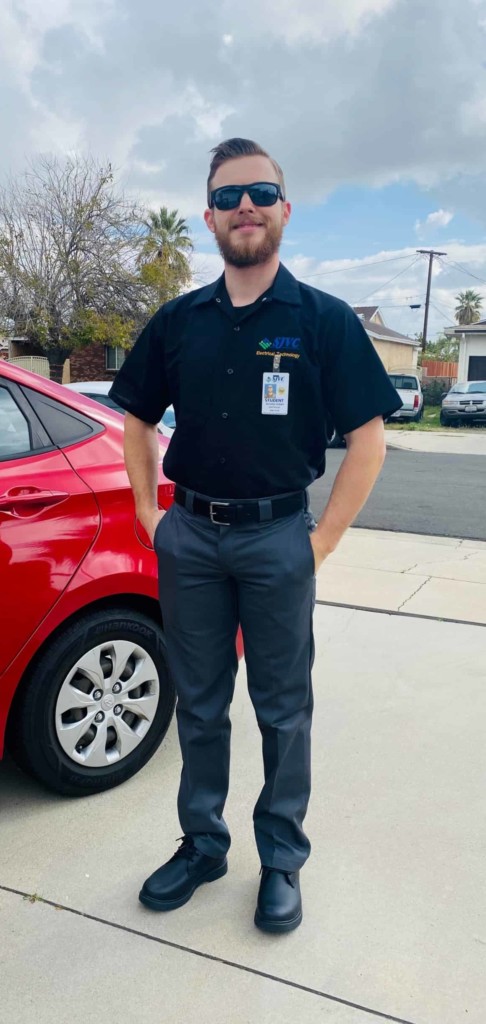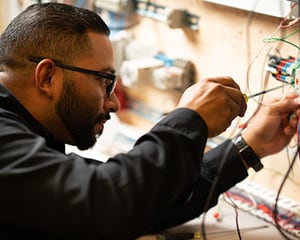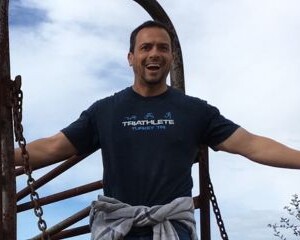Grad Q&A with Electrical Technology graduate Richard Kinsey
 Sometimes you just have to go in a direction you haven’t considered before. That’s where Richard Kinsey found himself when five years and a music degree into it, he realized that his dream of becoming a music professor and singing opera on the side was still not within reach. He needed a new focus. At 27-years old, could he start all over again in a completely different field?
Sometimes you just have to go in a direction you haven’t considered before. That’s where Richard Kinsey found himself when five years and a music degree into it, he realized that his dream of becoming a music professor and singing opera on the side was still not within reach. He needed a new focus. At 27-years old, could he start all over again in a completely different field?
His girlfriend, Daniela, had a suggestion. Her stepdad was an electrician who enjoyed many elements of his work: the demand for that type of work, great people to work with and using your skills to make life easier for people by bringing light into their homes and workplaces. Electrical Technology was a career that held a lot of potential…and appeal.
What was your first step in exploring career training to become an Electrician?
I looked online and SJVC was the first school that popped up. You’d prepare for your electrical certification, and I knew I would need that to begin work as an apprentice. Then I opened up the reviews and saw nothing but good things being said. I thought ‘This sounds fantastic. Why not start here?’
Was your first impression of the Electrical Technology program positive?
Every single one of the modules – Electrical Theory, Conduit Bending, OSHA (Occupational Safety and Health Administration) and Blueprint Reading – was very fulfilling.
Although I originally felt that the Blueprint Reading class would not be necessary for my future, as it turns out, employers want to see that on their ‘qualifications and skills’ list. It is a paramount skill to have. If you ever have trouble in the field running cables or knowing which devices are at which locations, being able to refer back to the prints gives you that security. I will know where everything should go to the smallest detail because I know how to read those prints.
Any big surprises in the program curriculum or training?
In our specialized courses in Residential Wiring, Commercial Wiring and Industrial Wiring and the PLC (Programmable Logic Controllers) – it was kind of like they took the training wheels off.
Coach (everyone calls Mr. Laumatia that) would let us ‘walk through fire’ – in his own words – when you first experience it. He lets you go on your own but supervises because safety is still the priority – but he lets you get the whole experience.
He wants you to use your mind, but gives you hints if you’re struggling too much. It was the perfect way to get us engaged and to get our minds going. There was an immense level of satisfaction to get that ‘ah hah’ moment when it all comes together.
Do you have a favorite class moment?
Probably the best moments were when we were working in the bays (constructed environments that simulate a residential home and a commercial building) where we run our cables through studs and install devices, such as switches, luminaries and receptacles.
We were given a unique project with some complex wiring with different devices and had to put our brains into how to wire this up within a 2.5-hour time limit. One person on each team was designated the foreman (I was foreman for our team) and as a foreman I would instruct my team on what to do, what materials we would need and how to install those materials. You could not physically participate but had to rely on your team to follow your instructions. Teams were in a race to see who could get the job done the fastest – and, in the end, it has to work!
My team wired up everything in an hour and ten minutes. It was such a fluid experience; everything happened just as it needed to. It didn’t feel stressful, didn’t feel forced. It felt right.
I thought in that moment that this is what I will be doing after I graduated, and I remember thinking, ‘This is amazing and I’m glad I’m doing this.’
What is one of the best things about the Electrical Technology program?
The instructors, absolutely, hands-down. They’re filled with so much passion and heart. They’re committed to our success. Every new instructor I studied under, I easily found myself saying that they were my favorite instructor at the end of each module. They were all so great.
What makes someone a good Electrician?
I love understanding how things work, down to the smallest detail. One thing that stood out to me early on in the program is the importance of understanding the course material and actually taking the work home and burning it in.
If you go into a job or project having the best interest of the next person who is going to work on something you wired, you are going to be the best kind of electrician.
What was your greatest hardship?
I finished in just 10 months, but finding that work, study, life balance was difficult. Working two jobs and studies and then I was in a car accident. One of the traits I’ve really embodied at SJVC is persistence and perseverance – to just keep going, no matter how hard it is.
I don’t think I could have done this without Daniela. She took on a lot of the burden of outside responsibilities and she provided encouragement and support so that I could have an easier time. She was my therapist and reminded me that everything would be fine.
How did you overcome that level of difficulty?
From Day One at SJVC it’s about how to be the best employee and best apprentice you can be (in your field). And how to be a better person every day.
We had discussion boards online with scenarios for a not-so-good-day at work and thought-provoking topics. It was a chance to discuss with classmates how you would react to those situations. Those conversations helped to mold us into better future employees. When we go into the field, if someone is being aggressive, we’ve already discussed it in class, and it will influence how we will react in that situation.
There were stressful days of class – a couple of exams I thought I was just going to nail and didn’t or a project I would put together that fell short. But even when you fail, it’s an opportunity to learn and grow. I ended up with a 4.0 GPA because I allowed failure to push me forward.
What is the importance of Programmable Logic Controllers (PLC) and why is it so valuable to master?
I believe that every member of a work force is valuable, but when it comes to technicians that handle PLCs, they’re the ones that keep the automation going, and oversee conveyor systems that keep packages and products coming through. Without that technician, the company is going to lose so much efficiency in their ability to create and process a quality product.
Every year of PLC knowledge and experience, which I will be getting in my new job at Amazon, will allow me to move into those higher positions. And even if my opportunities change, having that knowledge is so handy for moving up in any position in this industry.
What excites you about your new position at Amazon?
Right off the bat I’ll be troubleshooting using test equipment and voltage testers, trying to figure out what needs to be replaced or repaired to get the automation side to function again.
In the warehouses there’s going to be all kinds of lighting, conveyor and alarm systems, robotic arms moving around, laser technology and AGVs (Autonomous Guided Vehicles) like giant Rumbas, following metallic strips on the ground on predetermined paths. Each vehicle has software to communicate with each other. If something goes wrong, someone has to go in there to diagnose and fix the problem.
There’s a right way to do things and a seriously wrong way to do things. Having that knowledge for doing it right makes for very fulfilling work with lots of opportunity for advancement.
Amazon’s philosophy about employees is train, groom, advance.
How did you move so easily between singing opera on stage to a stake in the electrical field?
Discipline is a transferrable skill. That discipline to work hard and succeed, which I cultivated in opera, made the transition to the electrical field very smooth. After completing so many serious challenges, you get a grasp of your inner potential and begin to know that you can do some seriously difficult things. I know that the possibilities in life are limitless and whatever direction I push myself, I am capable of success.
How hard was it for you to achieve this measure of success in your career?
I’ve had to teach myself a lot about life. At very early stages I would always default to the mentality of ‘I’m not good enough’. As years went by, I got tired of thinking that way. Why aren’t I good enough? I started to pick at those weaknesses and work on them. I shifted to ‘I think I’m good enough’ to ‘I am good enough’.
Going to SJVC’s Electrical Technology program kind of drove it home. Leaving this program, I feel now – more than ever – that I am good enough.
In four or five years I do see myself moving up into those higher positions. Ultimately, I plan on furthering my education in automation and obtaining a career as an Automation Engineer or a Robotics Engineer.
Advice for others who might find higher ground through career education and training?
Keep climbing, always persevere, welcome challenges, and know that you can succeed.
I know there are a lot of tough moments in school, but every struggle is an opportunity for growth. Constantly facing and welcoming adversity puts you in a place where it may be uncomfortable, but you learn how to make that discomfort comfortable.

You might also like
More stories about
Request Information
All fields using an asterik (*) are required.




